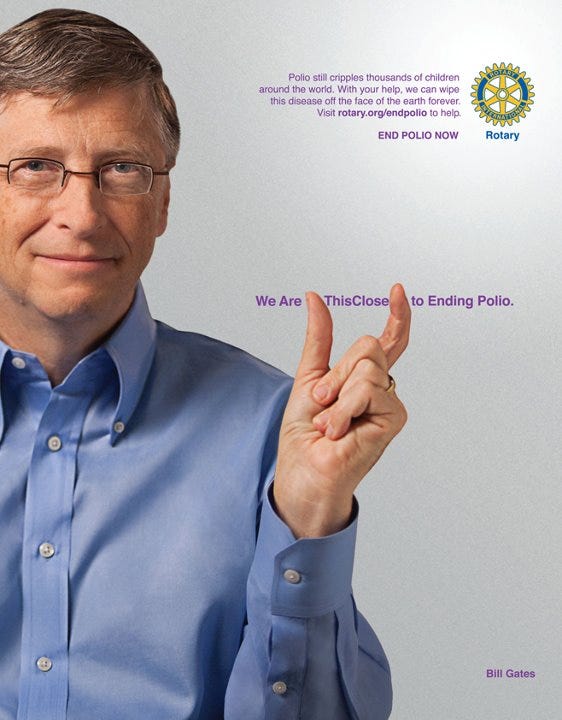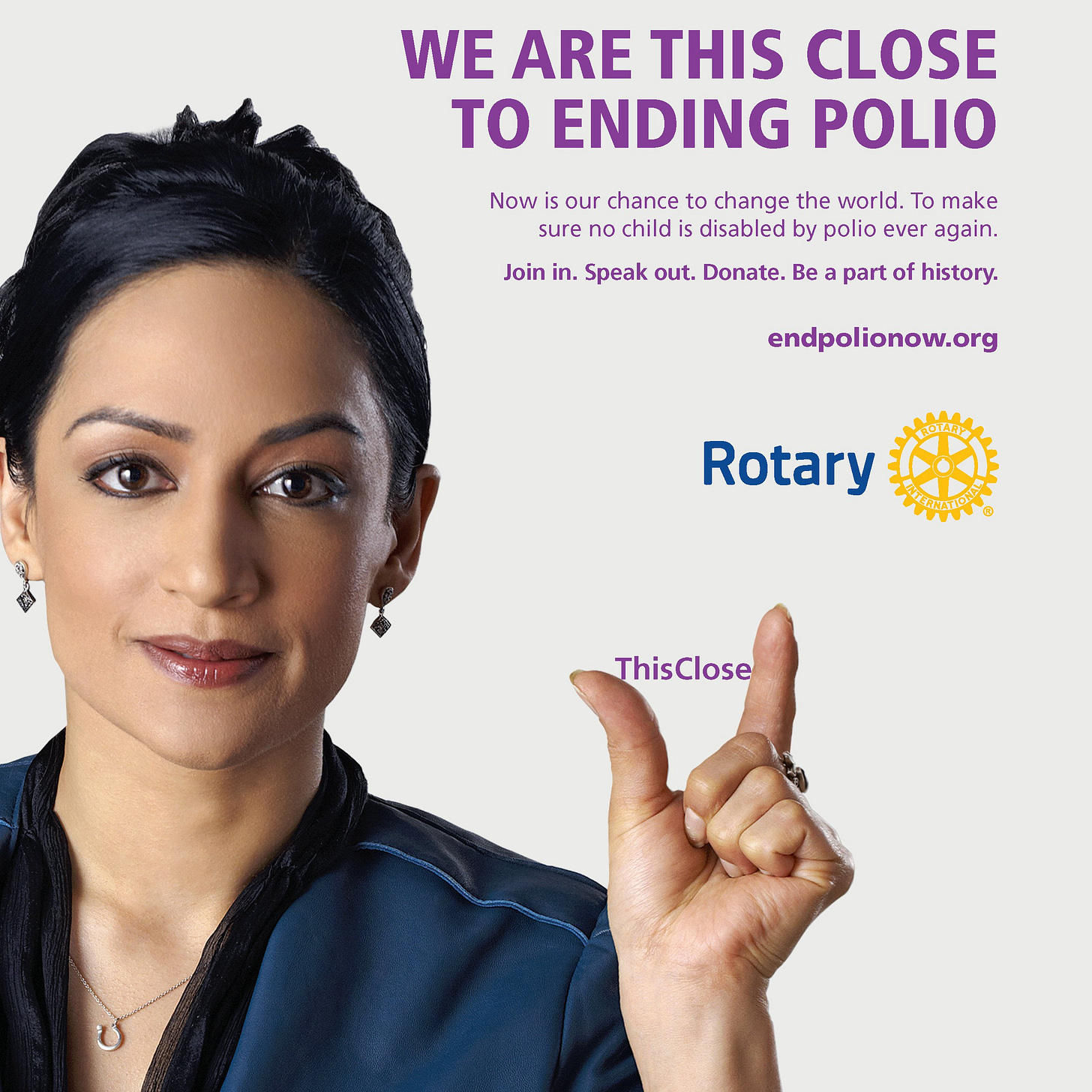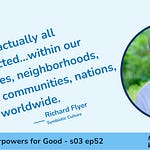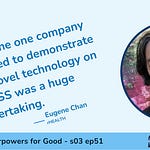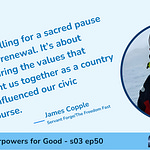Devin: What do you see as your superpower?
Paul: I thought a little bit about this because I’ve obviously heard the podcast before. I’m going to go with the analogy, and I’m going to say x-ray vision. By that, I mean that I can see patterns and networks of people and organizations and see how you can connect them. Out of that connection will come something that’s good for them, the people they serve, and society.
Paul Katz, CEO and founder of Entertain Impact, describes his business as a “social impact agency, and we use popular culture for social change.”
Polio Eradication
Some of Paul’s big wins have been working with Rotary International and the Gates Foundation on polio eradication. Impact Entertainment developed the “We’re this close” campaign that engaged public figures around the world, signaling just how close we are to eradicating polio.
This global campaign featured South Korea’s Psy, who gained fame for his worldwide hit Gangnam style.
Bill Gates also participated. (Bill was a guest on this show to discuss polio eradication.)
Archie Panjabi, who starred in The Good Wife, also participated. (She was a guest on this show as a formal part of her work on this effort.)
“If we can eradicate polio, it will be the only second human disease we’ve ever done after—I think smallpox was the first,” Paul notes.
The work wasn’t strictly limited to influencers. “We did some cool activities, activations, including what became a Guinness Book of World Records [record], where we had a certain number of influencers, whether it was Jane Goodall or it was a soccer player or an actor or whomever, just say ‘We’re this close.’ We eventually had, I think, over 130,000 people upload.”
Paul says the goal isn’t really in the activity. “What you’re looking for is down the line is the impact.”
Still thinking of polio, he lists the sort of questions he asks to determine whether the outreach has had an impact:
Does that have a bearing on persuading governments to continue the programs?
Does it give people in the field, the field workers, the very brave ones, especially in that corner where they’re under threat—does it give them more motivation?
Do they get pride from seeing this, that they’re acknowledged?
Measurement
“There are two different types of measurement,” Paul says. “There’s the financial. Did you get a good return on investment? That’s fairly easy to do.”
“The social return on investment, which is what I’m very interested in—it’s very difficult to measure that, but it’s much, much better than it was ten years ago,” he says. “You can measure it in different ways.”
By way of example, he offers, “We were doing a campaign for Europe where which gets people who have kind of graduated high school but haven’t launched yet. It gets them internships and trains them. About 80% of them get jobs.”
Of his firm’s work, he says, “We have to be very careful to be accurate and credible in what we measure.” The thought applies almost universally to those working on and measuring impact.
“If you take the Rotary campaign and the partners, you can say we were just the grain of sand on the beach of this,” Paul says. “I don’t want to overstate it, but you can say they and polio are gone from Africa, and they’re gone from India. So that’s the big, big impacts that we’re a very small part of.”
Paul has strategically used his superpower for big impact over his career. He metaphorically calls it x-ray vision. He’s talking about his ability to see strategic connections among people and situations—and then act on the vision.
How to Develop X-Ray Vision As a Superpower
Paul shared two specific examples of using his x-ray vision for significant impact.
His first example:
Very recently, I was chatting to these two organizations. I was involved through a friend of mine, Tom Chapin, with an organization called Whyhunger, which is founded by his brother Harry Chapin, who was a singer who died way, way too young.
This wonderful organization deals with food insecurity. Under its new leadership, it has become much more of a social justice organization. So, I've been involved with them over the years.
At the same time, we work very closely with SixDegrees.org, which is an organization that Kevin Bacon founded, based upon the game, and has done wonderful things under the leadership of Stacy Houston.
Kevin was hosting a TV show that came out actually co-hosting with the precise TV show that came out in 2021. They were looking for a philanthropic partner. And because I knew both of them, I introduced them.
So Six Degrees was kind of the executive producer of the show on CBS. Kevin and I were the hosts, and Whyhunger was one of the two partners. The other one is also an amazing organization called the NAACP Legal Defense Fund. They both were the partners.
That raised about $7 million for the organization, which, you know, has a big impact on what the work that they can do. The reason it's so top of mind was I presented an award to Six Degrees on behalf of Whyhunger on Tuesday of this week. And that was very nice to see them acknowledged by their peers. So I think that's maybe one example of the connectedness.
His second example:
I come out of music, and I'm still involved in music. Some of that goes into the film business, especially with Participant Media, which is the company founded by Jeff Skoll that does documentaries like the Obama one or Malala or RBG and also Green Book and Spotlight—movies that are entertaining but have substance, which is what we do. We always try and wrap our stuff up in entertaining packages, so it gets on people's radar, but it has some seriousness in that.
So because of my film music work, I know the guys at Pixar, so some of the guys, the marketing guy, and we put together a thing for the Grammys called the Grammy Music Education Coalition, which was basically a coalition of different organizations in the teaching music world. About 70 people, 70 organizations, I should say.
We were all concerned with the lack of music in public schools, especially for what we now call BIPOC folk. I could go on a lot, but I know we have a short podcast, but suffice to say, music has social emotional benefits and intellectual benefits that we all know about in addition to academic ones.
So, I reached out to Pixar. They were doing a movie—I don't know if you remember this movie called Coco. It was an animated movie about a kid whose grandfather was like the Elvis Presley of Mexico, but he wasn't allowed music. So that connection with the Grammys and the lack of music in the schools proved to be very powerful.
Pixar was fantastic, and the Grammys were fantastic. We had 200,000 or 300,000 kids involved in the program, and donations and music platforms that were were utilized and broadened.
I think it made some impact, especially in, I know, Nashville, for example, Chicago, Philadelphia and parts of California. So, this connecting people who've got amazing talent. In a way, it's in music. You do talent spotting, you know, you look for the next artist that's going to express themselves musically in a wonderful way.
In a way, that's what I'm kind of doing in my philanthropic and social justice work.
After hearing these illuminating examples of how he uses his x-ray vision to make strategic connections, I asked him for advice for developing this ability.
Paul recently finished writing a book, Good Influence, How to Engage Influencers for Purpose and Profit, that will be published in February.
He offered three tips for developing or strengthening x-ray vision:
Have empathy. “First of all, on a personal level, I need to learn to listen and make sure that I’m empathetic and other people’s experiences I take into account.”
Be systematic. “Secondly, I’m involved with Made in Memphis Entertainment, a Black-owned, Black-run music business. Its social mission is to engage people who have got super talent, super character, just not the networks. Mentorship is a big part of what we do. So, I think that that’s important that you’re systemized about it—you think about it, and you implement some proper structures around it.”
Scale up. “What I’m trying to do [in the book] is inform people and give them confidence. Organizations of whatever size, anywhere in the world, can do this. So, that’s trying to do it on a larger scale than just a one-on-one or within one organization. You’ve got individual, organizational and then hopefully a much broader perspective.”
By following Paul’s advice and his example, you can develop your x-ray vision into a superpower that will help you do more good in the world.





